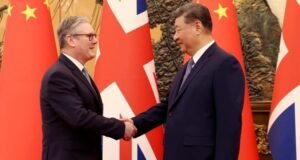
Should the U.S. make it easy for Americans to invest in Chinese companies intimately tied to the Chinese Communist Party, even despite other “U.S. government restrictions”?
Led by Representative John Moolenaar, who chairs the House Select Committee on the Chinese Communist Party, and U.S. Senator Rick Scott, several congressmen have penned a letter dated May 2, 2025 to the chairman of the Securities and Exchange Commission to urge that Chinese companies, twenty in particular, be delisted from U.S. stock exchanges.
The problem: their ties to the Chinese military and the risk to U.S. national security. “These entities benefit from American investor capital while advancing the strategic objectives of the Chinese Communist Party, supporting military modernization and gross human rights violations…. Many [of these high-risk firms] face U.S. government restrictions, maintain hidden Party control mechanisms, secretly support Chinese military applications, or are linked to slave labor.”
The heavily footnoted 32-page letter explains why each of some 20 companies should be a top priority for delisting. But the authors note that no company based in the People’s Republic of China is exempt from concern, since all must answer to the Chinese Communist Party.
“Under Beijing’s model of military-civil fusion, data, capital, hardware, and research—no matter how commercial on the surface—are ultimately harnessed for nefarious state purposes. Those purposes include surveillance, repression, and, in the event of a military conflict, operations aimed at defeating the American military and killing our service members. The SEC can—and must—act.
“We urge the Commission to begin delisting companies that are inseparable from China’s military-industrial system or fundamentally incompatible with U.S. disclosure laws. The full list of Chinese firms currently listed on major U.S. exchanges totals 286 as of March 7, 2025.”
The companies discussed in the letter include:
Alibaba. “A Chinese technology conglomerate designated by the Chinese government to lead national AI development and deeply embedded in China’s military and surveillance systems. Its cloud division works with two Pentagon-designated Chinese military companies—Global Tone Communication Technology and China North Industries Group Corporation—to support data translation, surveillance, and weapons development. Alibaba is reportedly tasked by PRC intelligence agencies to process data on a ‘daily’ basis. Moreover, Alibaba has maintained a CCP Party committee since 2008, now led by a former Chinese police officer and comprising over 2,000 members.”
Baidu. “A core enabler of China’s surveillance system and military-civil fusion strategy. It maintains an internal CCP committee established with CEO Robin Li’s support in 2011, now comprising 10 Party branches with over 2,500 Party members among its 40,000 employees…. Baidu Maps is embedded into the Integrated Joint Operations Platform used to surveil Uyghurs in Xinjiang, and its exclusive distributor there operates a designated CCP ‘party-building workstation.’ ”
BiliBlii. “China’s premier video platform for youth culture featuring anime, gaming, and interactive ‘bullet chat’ content, has reportedly been negotiating a ‘golden share’ arrangement with Shanghai state entities as of 2023, which would formalize government oversight of its massive Gen-Z user data and content policies. Bilibili established an independent CCP Party branch in 2017 under the leadership of its Chief Operating Officer, dedicating an entire floor as a ‘Party-building service station’ to systematically embed ideological work into both daily operations and youth-facing content.”
Tencent Music. “A Chinese streaming platform owned by Tencent Holdings, a Chinese military company designated by the Pentagon under Section 1260H for supporting China’s military and intelligence operations. Tencent runs a Party committee with over 3,000 members, has published the first Party journal in China’s internet sector, and maintains a dedicated Party WeChat account. It has transmitted user data to public security bureaus in Xinjiang and partnered with local authorities to embed surveillance into public transit systems.”
Weibo. “Weibo, China’s dominant microblogging platform, plays a central role in the CCP’s digital censorship regime, suppressing dissent and amplifying Chinese state narratives…. [Weibo domestic subsidiary Beijing Weimeng Technology] hosts active CCP Party branches that lead joint Party-building efforts, reinforcing the CCP’s ideological control within the company.”
Tip of the iceberg.
Yes. Delist.











